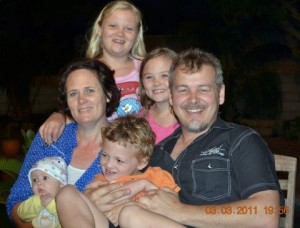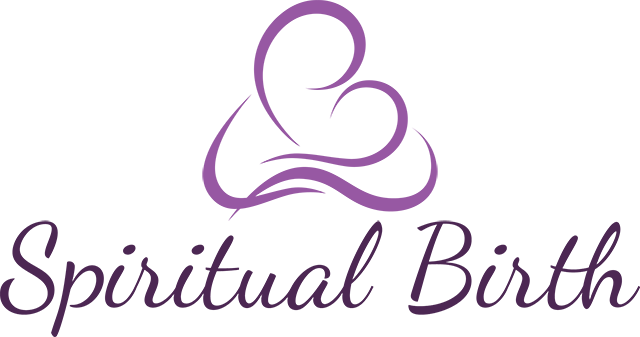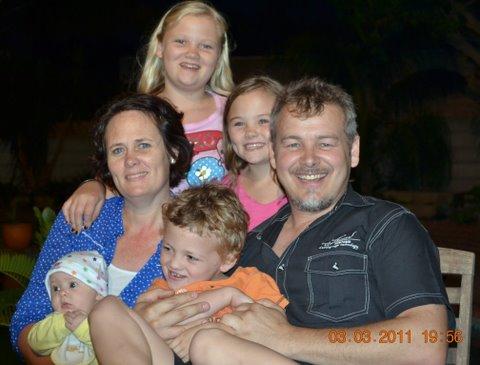No matter whether a baby is born by caesarian section or natural birth, the birth of a baby is still an amazing spiritual event.
The demand in my practice for Vaginal Births After Caesarian (VBAC’s) gave me the impetus to do some voluntary research into the subject of VBAC’s, given the possible risk to the mother of uterine rupture and demise of the baby. While it appears that the risk of uterine rupture is between 0.4-0.7 percent when a client has had one caesarean section, many of the studies do not control for the use of oxytocin and or induction of labour with prostaglandins. In other words, many women who try for a VBAC are given synthetic drugs during labour, which increases the intensity of the contractions, thus increasing the risk of rupture of the old scar in the uterine muscle.
While the actual risk of rupture is low, if the uterus does rupture, it could be a catastrophic event. Many women are prepared to face and bear this risk in their desire for a natural birth.
The success of a woman’s trial of labour for a VBAC depends on the reason for the original caesarian section. While the numbers of women included in studies with three previous caesareans are low, a study from 2002 showed there is no further increased risk after whether a person has two or more previous caesarian sections, as per the following statistics:
| Risk of Uterine Rupture with Low Transverse Uterine Scars* Revised 10/14/2002 | |||
| Number of Previous Cesareans | Successful VBACs | Rupture Rate | Perinatal Mortality |
| 10,880 Planned VBACs with one prior scar | 83% | 0.6% | 0.018% |
| 1,586 Planned VBACs with two prior scars | 76% | 1.8% | 0.063% |
| 241 Planned VBACs with three prior scars | 79% | 1.2% | 0 |
| Source: Miller, D. A., F. G. Diaz, and R. H. Paul.1994. Obstet Gynecol 84 (2): 255-258 | |||
The most recently published study shows there is no difference in morbidity between women who have had 3 or more caesarian sections, women who had one or two previous cesarian sections and women who had repeat ceasarian sections (Cahill, A., et al, 2010). The study concludes as follows: “Since the 2004 ACOG (American College of Obstetricians and Gynaecologists) publication of recommendations for VBAC, 6 studies have been published demonstrating that the risk of uterine rupture, in women with more than one prior caesarean who attempt VBAC, is not significantly increased over the risk for women with one prior caesarean. Furthermore, women with a history of more than one prior caesarean, and specifically three or more prior caesareans, have a small but measurable increase in maternal morbidity risk associated with delivery, regardless of mode”.

By the time clients seek out my care they have invariably seen You-tube footage of VBAC3 or other VBAC births at home, VBAC waterbirths and / or spoken to other women who have experienced successful VBACs. They also feel intrinsically that they are capable of giving birth without harm to themselves or their babies and are extremely happy when their efforts are successful and disappointed though resigned when they need intervention.
Tanya approached me last year for a vaginal birth after 3 caesarians (VBAC3), after she had weighed the risks versus the benfits of a repeat caesarian section. She gave birth to her fourth baby vaginally after an active labour of approximately six hours with no complications, behaving similarly to a woman giving birth for the first time. The benefits were that she was able to hold her baby immediately after the birth with her husband present, cord clamping was delayed, and the baby rooted, latched and suckled within half an hour. These parents were ecstatic! The mother was able to walk to the toilet within an hour after birth, we ate and drank in celebration together and she handled her baby with ease and relative comfort when breastfeeding. The downside was that her baby developed respiratory distress due to meconium present in the amniotic fluid, which was undetected prior to the birth and spent a few days in the NICU requiring medical assistance.
What this case highlights is that firstly, a midwife always needs to expect the unexpected and prepare for an emergency situation, especially with regard to a VBAC. Secondly, this event shows that Tanya’s first three caesarian sections were performed unnecessarily by her obstetrician(s).
When I asked her why it took so long to question her choices, she said she was young and did not understand all the implications of having a caesarian until after the operation. And it took her three pregnancies to understand the politics of childbirth and seek for the care that would respect her wishes. During her previous pregnancies, the obstetrician persuaded her that she and her baby were in ‘danger’ during labour (and there was no sign of fetal distress that she was aware of), perform the caesarian section and ‘save their lives’, then leave. Thereafter she started the long slow process of recovery from major abdominal surgery, bruised and in pain for weeks. Holding the baby after birth became more difficult after each successive caesarian section, she needed help for months and felt cheated and deceived. Not to mention the huge sums of money that were paid for each successive caesarian to the private hospital and the obstetrician involved.
The birth of a baby is always a spiritual event, whether a mother gives birth vaginally or by caesarian section. Birth is not a competition. All women who give birth, whether by caesarian section or natural birth deserve our respect and love. Carrying a baby during pregnancy and giving birth are acts of sacrificial love. Women seek to give birth naturally because they feel connected to a the primal force of creation within themselves and want to follow their intuition and inner knowing. Women have rights, and one of those rights is the right to choose a VBAC.
References
Tahseen S, Griffiths M. Vaginal birth after two caesarean sections (VBAC-2)-a systematic review with meta-analysis of success rate and adverse outcomes of VBAC-2 versus VBAC-1 and repeat (third) caesarean sections. BJOG. 2010 Jan;117(1):5-19.
Cahill A. Tuuli M, Odibo A, Stamilio D, Macones G. Vaginal birth after caesarean for women with three or more prior caesareans: assessing safety and success. BJOG 2010; DOI: 10.1111/j.1471-0528.2010.02498.
For more facts on VBAC see on the LINKS page:
http://www.childbirth.org/section/VBAC1.html
http://www.birthrites.org/guidelines.html


From my first ceasar i felt robbed i had an emergency c section with my first baby because the gynae felt that after 5 hours of labour i wasnt progressing fast enough. i still feel that all the facts wasnt given to me my mucous plug was released but my waters didn’t rupture so they induced labour and i feel that had my gynae waited my labour would have started naturally as i was only 39 weeks and had a healthy pregnancy. With my second son i did alot of reasearch on vbac as i never got over the regret of my ceasar however made the mistake of going to the same gynae he just adamantly refused and said after one ceasar he would never take the risk of natural birth and its complications of uterine rupture.
i felt defeated as my husband supported his decision for a second ceasar and once again another healthy pregnancy with no featal destress ended in a ceasar. By the third pregnancy I never lost hope and as the gap was 4 years i thought that my scar would have sufficiently healed for vbac and so asked again for this and once again refused. With the third pregnancy i accepted the ceasar but the hurt and regret of normal birth never left me. All 3 ceasars was hard as i developed severe uticaria after birth that no medication helped until after 6 months the uticaria leaves my body. As im allergic to pencyllin my pain meds was limited so after pain was bad and all 3 babies developed bad colic.
Im now pregnant with my fourth baby and have decided until medically proven that vbac is out this time i will perserver as ceasars has robbed me from enjoying the first precious months with my baby. i belive with all fate that i could have had alll my babies naturally but was robbed of this.
Thank you Marianne for giving me hope and i look forward to meeting you.
regards
Zulpha
Hallo Zulpha
Thanks for sharing your story. The negative effects of caesarian section on women and their mothering capacities are not well known by Obstetricians. Caesarians have been safe for a relatively short period of time, so the research has not yet been confirmed. But the feelings mother’s have post birth can be devastating. Let’s chat more when we meet and discuss the chances of a successful birth this time around.
Warm regards
Marianne
“During her previous pregnancies, the obstetrician persuaded her that she and her baby were in ‘danger’ during labour (and there was no sign of fetal distress that she was aware of), perform the caesarian section and ‘save their lives’, then leave. Thereafter she started the long slow process of recovery from major abdominal surgery, bruised and in pain for weeks. Holding the baby after birth became more difficult… she needed help for months and felt cheated and deceived. Not to mention the huge sums of money that were paid for each successive caesarian to the private hospital and the obstetrician involved.”
This describes the birth of my daughter to a T! Except that I was also forced into general anesthesia and have no memory of the first 3 days of her life. (The story is even more harrowing when you hear just how greedy the ob was with my 35+4 little girl). We are now in court and he is suing me for approaching a support group for help with PTSD. He is saying I am trying to ruin his reputation, but the truth is, there are hundreds of women out there he’s done the exact same too…almost to my sister too but luckily I opened her eyes just in the nick of time.
The only thing that I will disagree with you is on one issue: I didn’t give birth. My baby was ripped from my belly in an unnecessary and untimely manner. My baby was drugged and taken away from me and bottle fed. My ob took my clear birth plan of a med-free natural birth and wiped the floor with it. I fought back, I survived. I managed to breastfeed after 3 days. I managed to express when my daughter was in NCIPU almost dead at 28days from infected fluid in her lungs and other prematurity complications. I’m still breastfeeding her at 15 months. I fought for 4 months to develop my bond with her. I fought to be an attachment parent to a child I couldn’t bond with. I grieved for the pregnancy I lost as there was no connection between the end of the pregnancy and the baby girl in my arms. My daughter and I fought together to save each other. And we overcame. But I will never be able to say I gave birth to my daughter. And I am now fighting to accept that so that I will one day live with it without feeling so sad and betrayed. And I am fighting to accept that I am too traumatized and too messed up health-wise to have the large family I dreamed of. I hope to one day accept that without feeling so sad and betrayed.
Women like me carry this for a long long time…work like yours can help reduce the number of women who must suffer these abuses. That, and the healthy birth of mother and baby, should be the ultimate goal. Cesareans can save lives – but I fear that the majority of cesareans are actually destroying them!
Thank your for such a wonderful blog. If you ever decide to visit Malta, please let me know as we would gladly invite you to meet the members of our newly-founded Better Birth Coalition.
Thank you Bex for this heart rending post. I think so many women come away from their caesarian births feeling betrayed and robbed, especially when they suspect it to have been unnecessary. Have you met Douglas Kendal in the U.K.? He is an advocate for women like you and managed to remove one obstetrician from the roll through public action. His wife had four casearians before she hada natural birth and went on to have several more natural births. Stay in touch. It was lovely hearing from you!
Dit was lekker om die artikel te lees. Dit gaan baie goed met ons, ek is nog steeds ongelooflik dankbaar dat jy bereid was om ons te help met die geboorte van ons seun nadat ek drie keisersnitte gehad het. Hy is pragtig, dierbaar en so gesond. Kom kuier tog as jy hierdie kant toe kom.
How can this situation change? Who is in a position to campaign for med students to observe natural birth in an optimum setting? It is insane to think that within a thirteen year training period an ob / gynae never finds time to watch a birth unfold from first surges to that ecstatic first latch.
OK, if you’ll be there with me Marianne Ill have my next baby in a lecture hall and you can invite the lot!
Oh Amanda, Thank you Sooo much for this generous offer. Just a few students witnessing a homebirth in the privacy of your sacred space would be such a gift!
An interesting and eye opening article Marianne. If this is the kind of training that medical students are receiving, then it really does help to explain our society’s view of birth.
It seems as though part of your passion is in changing this. I am eternally grateful to woman like you!